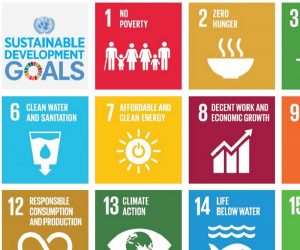The Sustainable Development Goals (SDGs), set by the United Nations in 2015, offer an entry point for educators to engage students in global and real-world challenges. The World of 7 Billion student video contest offers a unique way for your students to explore the SDGs – through research and filmmaking!
The contest challenges students to connect population growth with one of three global challenges in a short film, and this year the contest topics are: Ensuring Economic Opportunities, Sustaining Water Systems, and Improving Climate Resiliency.
So, how do the World of 7 Billion video topics connect with SDGs?
Ensuring Economic Opportunities
Economic stability and independence are two of the most important prerequisites to a person’s long-term happiness and well-being. This contest topic fits well into SDG 1, SDG 5, and SDG 8.
Currently, 8.6% of the world’s population is living in poverty. Inequality in compensation based on gender still exists. Based on data from 62 countries, we know that the median hourly gender wage gap is 12% and that gap widens to 20% in managerial and professional occupations. One fifth of the world’s youth are not receiving education/training and are not employed. Even here, young women are at a higher disadvantage as they are more than twice as likely as young men to be unemployed and not receiving education or training. Many of the world’s workers are exposed to risks and recent data tells us that 3 deaths occur per 100,000 employees and a median of 889 non-fatal injuries occur per 100,000 employees.
Sustaining Water Systems
Water is essential to life and the way in which we consume this resource is becoming increasingly important. This contest topic fits well into SDG 6 and SDG 12.
 About 70% of all water removed from rivers, lakes and aquifers is used for irrigation. These systems are increasingly strained as global population grows and with it the demand for food and water. The world’s oceans and rivers are reservoirs for 80% of untreated wastewater resulting from human activity. Worldwide, 2 out of 5 people lack access to a basic handwashing facility with soap and water at home. As essential as water is, in 2017, 785 million people were still without basic drinking water services. In order to protect this invaluable resource, we must consider the implications of pollution, be it human waste, or industrial waste, on the world’s water systems.
About 70% of all water removed from rivers, lakes and aquifers is used for irrigation. These systems are increasingly strained as global population grows and with it the demand for food and water. The world’s oceans and rivers are reservoirs for 80% of untreated wastewater resulting from human activity. Worldwide, 2 out of 5 people lack access to a basic handwashing facility with soap and water at home. As essential as water is, in 2017, 785 million people were still without basic drinking water services. In order to protect this invaluable resource, we must consider the implications of pollution, be it human waste, or industrial waste, on the world’s water systems.
Improving Climate Resiliency
The impacts of climate change are real and already being felt by people around the world. This contest topic fits well into SDG 7 and SDG 13.
 Climate change is and has been here. Globally, we’ve been feeling its impacts by way of hurricanes, droughts, forest fires, and more. Slowing climate change is a top priority, as is helping those struggling from the impacts of climate change adapt. Sea-level rise as a result of climate change is especially troubling for residents of South Pacific island nations like Kiribati and Tuvalu. These islands may be entirely submerged by rising sea levels in the coming decades, turning its residents into climate migrants. Extreme weather continues to put unbearable burden on cities not built or designed to withstand intense rainfall and high winds, resulting in loss of life and significant economic loss. Worldwide, two-thirds of extremely poor workers are agricultural workers and with the rapid degradation of the world’s soils with climate change poised to put even more pressure on this precious resource.
Climate change is and has been here. Globally, we’ve been feeling its impacts by way of hurricanes, droughts, forest fires, and more. Slowing climate change is a top priority, as is helping those struggling from the impacts of climate change adapt. Sea-level rise as a result of climate change is especially troubling for residents of South Pacific island nations like Kiribati and Tuvalu. These islands may be entirely submerged by rising sea levels in the coming decades, turning its residents into climate migrants. Extreme weather continues to put unbearable burden on cities not built or designed to withstand intense rainfall and high winds, resulting in loss of life and significant economic loss. Worldwide, two-thirds of extremely poor workers are agricultural workers and with the rapid degradation of the world’s soils with climate change poised to put even more pressure on this precious resource.









